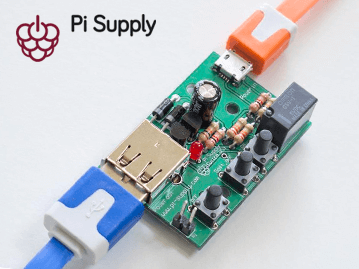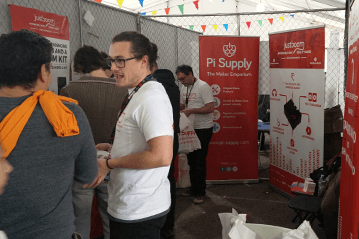IoT Interview: Pi Supply
Pi Supply is an online Pi and Maker distribution company that stocks a range of Raspberry Pi-related devices and accessories for worldwide shipping.
In July 2016 Pi Supply announced a formal partnership with Premier Farnell. We spoke to Pi Supply founder Aaron Shaw about Pi Supply’s journey from part-time Kickstarter project to a rapidly expanding global business model...
In a nutshell, what is Pi Supply?
We’re a Pi and Maker distribution company with a difference, in that we have much more of a focus on in-house R&D. In addition to stocking official Raspberry Pi accessories, we’re constantly developing new applications for makers, hobbyists and industrial customers.
How did the Pi Supply project come about?
It all started with the Pi Supply Switch, which was a hobby project that I ran on Kickstarter while studying Engineering at the University of Leeds. I was frustrated by the fact that when I was working on my own Raspberry Pi, I had to physically crawl under the bed to access the mains power supply. So I developed a fairly simple electronic circuit so that I could switch the power on and off more easily.
At first, running the project on Kickstarter was purely a way to make it cheaper to produce for myself while providing an opportunity to sell it on to others, which felt like a win-win. I wasn’t necessarily expecting it to become a fully fledged business, but the response encouraged me to keep pushing it further.
Why do you think crowd funding has worked so well for you?
At the beginning it was purely a practical choice – crowd funding provided an easy way to develop the project while still pursuing my University studies. Platforms like Kickstarter offer a very tech-oriented feed into the open source community. If you make something good, people will respond to it. So putting the Pi Supply Switch out there really got the ball rolling, and once that happened, it didn’t make sense to stop.

The Pi Supply Switch
You recently concluded another successful Kickstarter campaign for the PiJuice. Tell us about that project...
Raspberry Pi is probably the most popular single board computer on the market, but for all of the resources available for it, we felt that what was lacking was a reliable portable power source to help engineers and hobbyists to undertake remote projects in a safe and convenient way.
We developed the PiJuice as a portable project platform, not only offering an uninterrupted power source for the Raspberry Pi, but also allowing the user to take a project off the grid when necessary. We hit a massive 1200% of our initial funding goal, with over £120,000 from 2,417 backers. We’re currently finalising shipment of the first batch of devices.
A lot of the hardware you create is specifically tailored towards Raspberry Pi – how does the relationship between Pi Supply and Raspberry Pi foundation work?
There’s no direct relationship as such, but they’re certainly aware that we exist and where it’s useful for us to share product plans or sponsorship opportunities, we do. I used to be quite heavily involved with MagPi – which is now the official Raspberry Pi magazine. At that time it was an independent publication, but we worked closely with the foundation, and eventually handed it over for them to take it forward when we ran out of time to do it ourselves. So a lot of those connections still remain.
Are there any particular concerns or drawbacks with being so closely aligned with a single brand?
Yes and no. I think if you are going to be associated with a single brand, Raspberry Pi is probably quite a good one. They’ve done a lot of great stuff for the maker and educational communities, and it seems like they’re here to stay.
That said, as we’ve started to expand the business we’ve been actively working towards adding more diversity to our product range, both in terms of supporting other major brands like Arduino and Beaglebone, and producing standalone products that aren’t aligned with any one single board computer.
 Aaron Shaw - Director |  John Whiting - Head of Marketing |  Simon Browne - Head of Operations |
How did Premier Farnell and our subsidiaries become involved with Pi Supply?
We had a relationship with CPC from very early in the life of Pi Supply, and we’ve been developing that relationship over the past year. At the launch event for Raspberry Pi 3, we were introduced to some members of Premier Farnell’s Strategic Alliance team, and we took the opportunity to discuss some ideas. That led to more meetings and discussions about how we could develop the relationship.
Although we’re expanding, we’re still a small company with limited resources. We’ve handled manufacture and distribution ourselves in the past, but our key focus has always been on R&D and making products. Farnell already has a massive distribution chain and access to a lot of resellers, so with them on-side we didn’t have to build that side up ourselves.
With PiJuice, we selected Embest to handle ongoing manufacture and distribution because they offered us the best of both worlds in terms of price and quality of service. Because Premier Farnell and Embest already produce a number of official Raspberry Pi add-ons, we felt confident that the quality would be high and that they’d be a reliable partner. Ultimately, it’s about allowing us to do what we do best and Premier Farnell/Embest to do what they do best.
What are some of the biggest challenges you’ve faced so far in developing Pi Supply?
We have a lot of ideas and projects on the go, and finding the time and resources to bring those ideas to fruition can be a challenge. Like a lot of small businesses, cash flow is obviously a key concern, particularly as you start to take on employees and the orders start to get bigger. In this sense, our strategic partnership with Premier Farnell has been particularly helpful, as it’s removed some of that pressure and allowed us to focus on our key competitive advantage, which in our case is our products.
Another challenge is to differentiate yourself in the market. The good thing about the Raspberry Pi market is that it hasn’t become particularly saturated yet. That said, things are moving very quickly and a lot of big companies are starting to do things in the space. Fortunately, I think we have a good idea of who we are and what makes us unique, which we’re going to continue to focus on as we evolve as a business.
Finally, going straight from University to running your own start-up business, you undergo a very steep learning curve in terms of how much time you need to spend on things like infrastructure, relationship-building and administration. It’s a lot of plates to keep spinning all at once.
What are some of the key moments in the development of the company so far?
Bringing a campaign to fruition and launching a new product is always a really exciting time, because it takes so much work to get to that point. Actually seeing your product in people’s hands and getting feedback is always a really good feeling. We receive a lot of pictures and comments through social media, people sharing their projects and complimenting the hardware. That’s really what keeps us going. PiJuice has been a long and occasionally bumpy road, but we’re finally coming to the end of it now. The day we finally start shipping those devices out will be a good one, despite the amount of packing we’re going to have to do that week!

Where do you see Pi Supply 12 months from now?
We have a lot of product launches coming up in the next 12 months that we’re quite excited about, including starting shipping the PiJuice and various others we’re not quite ready to talk about yet. We’d also like to keep working towards expanding and solidifying the platform and building on our achievements so far. I’m hoping to see us double in terms of employees and attend a lot more Maker Faire style events, to engage with our core audience and keeps the conveyor belt of ideas moving.
We’re also planning a full redesign of our website – which we hope to launch in early 2017. In addition to adding a lot more tutorial content and improving the user experience, we’re also hoping to launch a customer forum to help us drive more community engagement, with dedicated customer and technical support for everything from advice on buying the right product to answering coding queries.
What about five years from now?
That’s a much tougher question, because it’s a longer period of time than that in which the Raspberry Pi has even been around. We’re definitely expecting to see continued growth within this market, particularly as various industrial applications for single board computing really start to gain traction. One vision that we share closely with Premier Farnell is of bridging the gap between the educational and maker markets and more industrial applications, so that the two can feed each other. I’d definitely like to see Pi Supply playing an active role in that over the next few years.
What other start-ups and emerging technologies are you most excited about at the moment, besides your own?
Most of mine seem to involve Elon Musk in some way! Automation and autonomous cars, the global transition from fossil fuels to renewable energy and anything to do with space is really exciting to me. Closer to home, it’s going to be really interesting to see how IOT and connected life develops now that the technology seems to be moving forwards so quickly and more companies are starting to get involved. IOT sometimes seems like it could be a bit of a fad, but on the other hand it’s essentially a natural progression from where we are now.
Are there any technologies and innovations that aren’t currently available that you’d really like to see develop in the IoT space?
A lot of the really exciting things that are happening today are progressions of existing technology. Take radio, for example. Fifty years ago it barely existed, and so much has sprung from it since then, right up to the fact that you can almost get Gigabit Wifi connections these days. I’m excited to see what the equivalent of radio technology might be for our generation.
I think the two areas it’s most likely to come from are quantum physics and synthetic biology. The implications for some of the research that’s currently going on in a purely academic mainframe are insane. As soon as that research starts to be applied and industrialised, it’s going to open up whole new frontier.
Finally, what advice would you give to other start-ups operating in the IoT space who are looking to take their projects to the global market?
I think we’re quite an unusual case, in that Pi Supply was never necessarily intended to become what it is now. We’ve probably taken a bit more of a meandering approach to growing the business until this last year or so. For me, until a few months before I finished University in 2014, I was expecting to go into a graduate job as an engineer. It was only when I started to think a bit more about what the business was and what it meant to me that I realised I’d regret it for the rest of my life if I didn’t give it a try.
I suppose the main thing I’ve learned is that you’ve got to work really damn hard. It’s not easy to run a start-up of any kind. You have to put in a lot of hours, probably have a lot of support from family and friends to get you through it, and on top of that it’s just about finding the USP of your business and product and believing in it enough that you can persuade others to believe in it as well – as trite as that may sound!
Looking back, if I had the chance to make the decision again, despite the bumps in the road, there’s no doubt in my mind that I would. It’s a lot of fun, and I’ve probably learned more in the past two years than I have in the rest of my life put together, particularly about the way business and the world works in a very fundamental way. It’s been a sharp learning curve.
Additional information for this piece was provided by Pi Supply director Simon Browne and Chief Marketing Officer John Whiting
How did Premier Farnell help Pi Supply to focus on their core business strengths? Read our case study here.